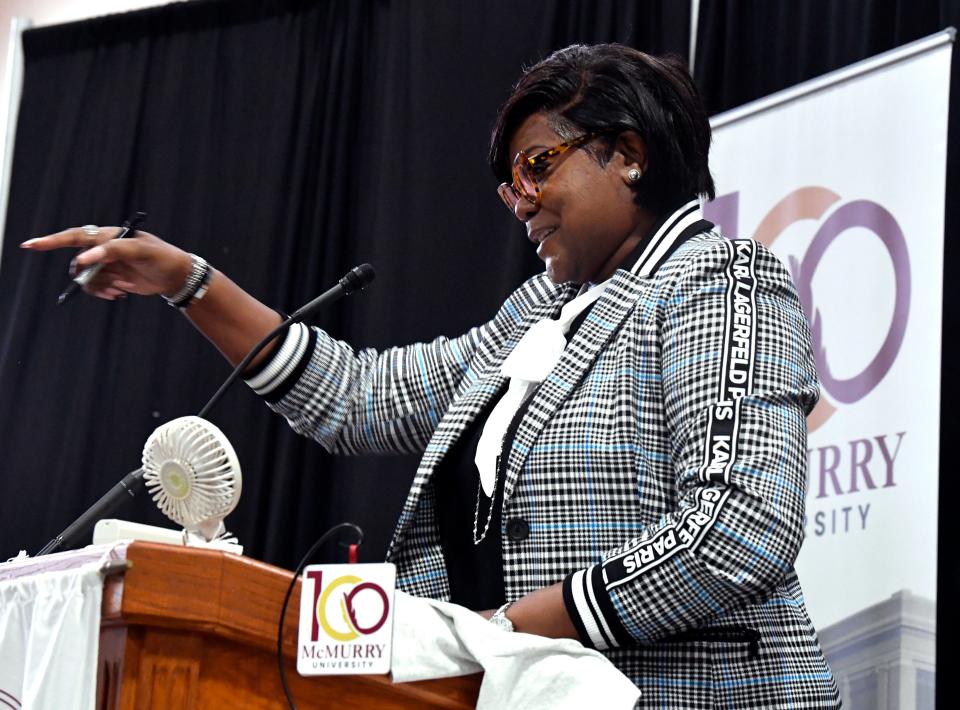I’m determined to make sure Black women get annual mammograms. Breast cancer is a menace
I grew up surrounded by a big, loving family. I was attached to my mother and her 13 siblings.
We did everything together, including weekly shopping trips to Walmart. As people say now, it was our third space.
As a child, I ran around Walmart and spent a lot of time in the sports section while my mother and aunts shopped for household items clothing, and other necessities. If Walmart Supercenters had existed then, we would have been there even more for groceries, beauty treatments and medical care.
Over the years, those family trips started to dwindle as eight of my aunts and uncles were overtaken by different forms of cancer — three aunts to breast cancer and two uncles to prostate cancer. Eventually, I lost my mother to colon cancer as well.
I thought I knew everything about cancer and the importance of cancer screenings, yet somehow, I still didn’t have all the facts. Maybe it was the trauma of losing so many to cancer, or maybe it’s because it’s so common for the Black community not to seek out medical care.
“It’s not what we do,” is said all too easily.
I knew I needed a mammorgram
During a visit to New York earlier this year, something deep in my gut told me I needed a mammogram. At 53, I’d never had one before, and it had been coming up a lot in conversation, both professionally and with friends and family.

I visited an outpatient screening facility in Queens — RadNet’s Lenox Hill Radiology — and the radiologist found something on my X-ray image. I broke down, fearful for my life and my role as a wife and mother.
Dr. Senayet Agonafer walked me through everything, including what she saw and the important next steps, which in my case was a biopsy. Agonafer was kind, thoughtful and easy to connect with, which reassured me during this emotional time. What’s more, she looked like me — Black female physicians are unfortunately not too common.
Flash forward a few days, and my results came back negative. I broke down again, though this time in relief. I also felt a new desire spark within me to help others in a way I haven’t before. I thought: If I had this huge family history of cancer and still didn’t know I needed to get annual mammograms, then how would other people know?
While the experience was emotional, it was easy enough — at least logistically. My mammogram screening wasn’t scary, it didn’t hurt and it wasn’t time-consuming. What’s scary is pushing off screenings until it’s too late and finding yourself with a late-stage cancer diagnosis.
Breast cancer is a menace for women — especially Black women
After skin cancer, breast cancer is the leading cause of cancer-related death among women, and early detection significantly improves survival rates. There is a 99% five-year survival rate when breast cancer is detected early in Stage 1. This is the true meaning of “the sooner you know, the better.”
Breast cancer is also the leading cause of cancer death for Black women, according to the American Cancer Society. While Black women are less likely to be diagnosed with breast cancer than White women, Black women are about 40% more likely to die from the disease.
This is personal to me, and I can’t help but think about the what-ifs. What if my family had gotten screened early and annually? What if RadNet locations had been accessible across the county, staffed with relatable physicians? What if RadNet had their MammogramNow centers within Walmart like they do now? What if …
Maybe I wouldn’t have lost so much of my family so early.
Opinion: I just graduated college. Instead of feeling pride and clarity, I'm fighting hopelessness.
I can’t change the past, but I can use my platform to educate others and help them change their futures. I’m working closely with RadNet now to promote cancer screenings and mammogram recommendations and spread awareness about RadNet’s national locations and their new accessible MammogramNow centers inside Walmart. So, all of us, plus our moms and aunts, can no longer make the excuse that we don’t have the time for a screening or access to an outpatient facility.
As a woman and an athlete, I understand the importance of caring for our bodies and prioritizing our health. And as a woman of color, I know the fear associated with getting screened for cancer. I also know that we need to educate ourselves and take control of our health.
My basketball career has given me a platform to influence millions of people, and having seen firsthand the devastation cancer can bring, I am honored and excited to help others understand the importance of early detection and life-saving preventive care.
I want us all to stop being so scared of what physicians might find. It’s better to find out early so that preventative steps can be taken. I was lucky enough to have a benign biopsy, and I am grateful not to have to be haunted by that "what if.”
I am naturally competitive, so I challenge you to take control. I challenge you to confront your fears and take charge of your health.
Sheryl Swoopes was the first player to be signed in the WNBA, is a three-time WNBA MVP, and was named one of the league's Top 15 Players of All Time at the 2011 WNBA All-Star Game. She is now a spokesperson for RadNet, Inc.
This article originally appeared on NorthJersey.com: Black women need annual mammograms this is why

